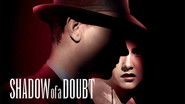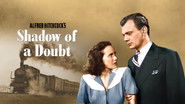Exoticalot
People are voting emotionally.
Dotsthavesp
I wanted to but couldn't!
Robert Joyner
The plot isn't so bad, but the pace of storytelling is too slow which makes people bored. Certain moments are so obvious and unnecessary for the main plot. I would've fast-forwarded those moments if it was an online streaming. The ending looks like implying a sequel, not sure if this movie will get one
Philippa
All of these films share one commonality, that being a kind of emotional center that humanizes a cast of monsters.
alexanderdavies-99382
"Shadow of a Doubt" was the first truly American film by Alfred Hitchcock. His previous films in Hollywood had strong overtones of being in a British setting but that all changed after 1943 with the release of "Shadow of a Doubt." A psychopathic killer who is wanted in connection with a series of brutal killings, flees his home city and travels many miles to a small town where his relatives live. He attempts to conceal his real demeanour with that of being "the charming and easygoing long lost uncle." He maintains this facade until his niece (Teresa Wright) suspects her uncle is not quite what he claims to be. There soon develops a game of cat and mouse between uncle and niece as her suspicions lead to her distancing herself from him and his smokescreen gradually evaporating as a result. The scene where Wright looks up some old newspaper articles at the local library, is a major development in her discovering what her uncle really is. Joseph Cotton was usually cast as the decent and ordinary everyday kind of character. When I first discovered he played a killer in a Hitchcock movie, I had slight reservations as to his suitability and credibility. Boy was I wrong! The actor makes for a creepy and sinister murderer who shows no remorse for what he has done. Hitchcock got precisely the right of performance from Joseph Cotton, there is nothing theatrical or superficial about it. Teresa Wright does a good job in projecting both vulnerability and determination. It is quite disturbing how the rest of the family are completely unaware of what is happening during the film. To them, Cotton is just a kind and ordinary person, like the sort of person you pass in the street. Hitchcock's creative juices were in full flow in "Shadow of a Doubt."
dougdoepke
After 200+ reviews, there's not much left to say. Generally speaking, Hitch was not known as an actor's director, even calling them "cattle" on one occasion. Yet here in Shadow are two of the most impressive turns in the director's legendary canon. Wright's small town girl must go from wide-eyed innocence to suppressed dark suspicion as she suspects more and more about her treasured uncle. As niece Charlie, it's her reactions that must register the movie's deepening suspense. It's an abrupt range that despite the demands remains impressively memorable. A standout Oscar performer, mainly from the 40's, Wright has regrettably slipped into semi-obscurity despite her obvious talent. Never glamorous, she could project a surprising range behind that winning smile, as she does here. On the opposite side is Cotten's Uncle Charlie, registering here a dark dimension along with a sincere handshake. His Uncle Charlie is not all bad. Instead Charlie's small town upbringing has not equipped him for what he sees as a cruel wider world. Thus he's matured into two sides, one a fortune-hunting killer, the other a latent small town citizen. Thus, his return to Santa Rosa is not only an escape but a wish to be reborn into the community womb. In that regard, catch actor Cotten's often fleeting dark moments before his sunny side again surfaces. Nonetheless, his murderous side has already doomed those small town hopes.In a larger sense, Charlie's internal struggle with her uncle has become a struggle for her maturing soul, as she too must face realities of a wider world brought suddenly home to her. In that regard, the movie's impact remains as much a matter of actors as it does of plot, and Hitch's concern for story was never better combined.
Antonius Block
Hitchcock said this was his favorite film, and there is a quiet evil about it that makes it truly horrifying. Uncle Charlie (Joseph Cotten) is on the run from the law on the East Coast, and he settles in with his sister and her family in Santa Rosa. Trouble is just behind him though, and it gets worse when his niece (also 'Charlie', named after him, and played by Teresa Wright) begins to suspect him of being the "Merry Widow Murderer".I considered a slightly higher rating, but thought the pace in the first half of the movie was a little slow. Some of the tension is also missing because we're pretty darn sure Uncle Charlie is guilty. On the other hand, there is a real small town feeling to this setting, helped in no doubt by Thornton Wilder being one of the screenwriters, and the characters of Charlie's father (Henry Travers) and his friend (Hume Cronyn) passing the time by talking about the perfect murder are absolutely priceless. The second half, including the increasing revelation of Uncle Charlie's dark views of humanity and the lengths to which he will go to protect himself, is what make the film so sinister. As the movie came out during WWII, it seems to have a direct parallel to the evil leaders loose in the world, particularly in the film's final scene.
sharky_55
I wonder what sort of film Shadow of a Doubt might be if Hitchock had cut that opening sequence with Cotten dodging the two agents and whisking away to a safer place. Sure, it does establish his boldness and knack for disappearing right in front of our very eyes (it helps that they do not know what he looks like so he can walk right by them) but it also establishes for a fact that Uncle Charlie is hiding something, and somewhat undermines the slow process of discovery that Charlotte has to go through. Surely the absence of it would make the best scene of the film even better. We overhear Joseph and Herbie musing as they always do, and they mention that the Merry Widow Murderer is dead. Then Cotten climbs the stairs, the slowly and deliberately turns back to give a pointed, menacing look back at Charlie in the sliver of sunlight in the doorstep. The soundtrack climaxes, and in that moment both characters know exactly where the real murderer, and so does the audience. It's a stunning moment of silent tension, mainly because neither can directly admit what they know, and everything else afterwards is merely a formality. The final 'fight' is a little silly now, and the forced romance with Detective Graham seems as though they plucked the nearest available male to give a little comfort for the young Charlie.The two Charlies are certainly a shining light here. Wright does not nearly resemble the teenager she plays (she was in her mid 20s) but by all means is radiant; she has the kind of vivacity and youthful idealism from the get go that Hitchcock ladies aren't often armed with and is the shining light from the start. She rises from the cosy domesticity of the small town as if she were totally aware that there is no other way to kickstart the movie than to get Uncle Charlie into the frame, and then beams constantly at how what a mysterious and imposing character he is. She has the all the imperative here. Opposing her is the sharp- eyed Cotten, who juggles the appearance of a family man rather well, only cracking once to give a frightful monologue. The clash between the leading pair makes the movie a worthwhile study in tension; we can see Hitchcock winking from every scene as Charlie goes closer and closer to discovering the truth, even as she chalks it all up the the excitement of her uncle's enigmatic lifestyle. When she first receives a murdered victim's watch, they key light flashes a little glint in her eye, but it's not yet the moment of discovery - she is merely overjoyed at such a cool present from such a cool uncle. A shake up indeed. What the intro does allow is for all these Hitchock nods at the source of the criminal contrasted with Charlie's initial obliviousness; the way she wonders how they just happen to be the 'average' family chosen for a nation-wide survey, the way Emma shrieks at the visitors to not take pictures of the ugly scenery, and the running dialogue of Joseph and Herbie as crime enthusiasts who endlessly speculate on the perfect murder. First it is a harmless hobby. Later it inserts a grim subtext until Charlie cannot bear it any longer. It's the classical build-up of dramatic irony, and Hitchock subverts his own tendencies; Wright closes the door and leans against it suggestively, and then Cotten grasps her hands roughly as he snatches the newspaper fragment, and for a moment, the pose is like two lovers about to embrace and kiss. But by foregoing that convention dynamic we have something a lot more interesting.











